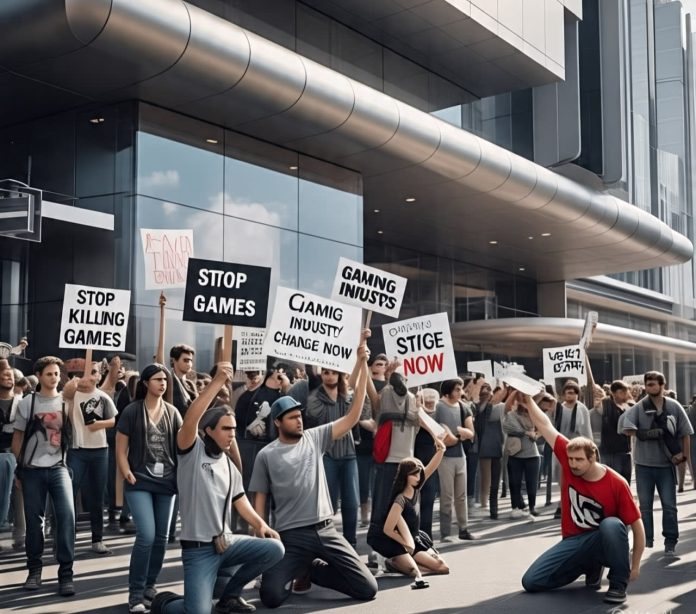Stop killing games.
It’s a phrase you hear more and more in gaming communities—and for good reason.
Gamers around the world have watched as companies shut down online games, remove them from stores, or kill support entirely, leaving players with nothing.
- It doesn’t have to be this way.
- In this article, we’ll explore:
- What “killing games” means
- Why companies keep doing it
- The real impact on players
- Sustainable alternatives for developers
- How we can protect gaming history
Let’s break it down.
What Does “Killing Games” Mean?
“Killing games” is the phrase players use when companies shut down online games or remove them entirely from stores.
This includes:
- Shutting down servers for online-only games (making them unplayable)
- Delisting games from digital stores so new players can’t buy them
- Ending support so games break on newer systems
- Removing them from subscription libraries
A famous example is Marvel Heroes, an MMO shut down with virtually no notice. Another is Ubisoft’s planned decommissioning of old Assassin’s Creed games’ online features—even for players who paid for them.
These decisions often leave fans furious and heartbroken.
Why Do Companies Shut Games Down?
Companies usually argue it’s about money and resources.
Reasons include:
✅ High server costs
✅ Declining player base
✅ Licensing issues (like expired music rights)
✅ Focusing on newer games
From a business view, it’s easy to see why they do it.
But here’s the problem: players already paid for these experiences.
When a company “kills” a game, it often destroys something people love, with no way to preserve it.
The Human Impact: More Than Just Entertainment
Many people dismiss games as “just games.”
But for millions, they’re:
🎮 Hobbies
👫 Social spaces
🧠 Sources of comfort
💬 Places for community and friendship
Imagine spending hundreds or thousands of hours in a game, building a character, joining a guild, and making friends—only to have it vanish forever.
Players often describe it like losing a home.
This is especially painful for:
- Disabled or housebound players who rely on games for social contact
- Older gamers revisiting childhood favorites
- People who use games to cope with stress, anxiety, or grief
When companies shut these games down, they don’t just cut costs. They hurt real people.
Preserving Gaming History
There’s also a cultural issue.
Games are art, culture, and history.
When companies kill them, they erase pieces of that history.
Imagine if:
📚 A publisher decided to burn old books that weren’t selling
🎥 A studio deleted all old movies to make room for new ones
That’s unthinkable in other media. Yet it happens with games all the time.
Game preservationists try to save these titles, but they often face legal barriers. Companies can sue fans for hosting private servers—even when the original is gone forever.
If we want to treat games as serious culture, we have to stop killing them.
Sustainable Alternatives: How Developers Can Do Better
Shutting games down entirely isn’t the only option.
Here are real solutions developers and publishers can use:
1. Offline Modes
Many online-only games could work with offline or local modes.
✅ Let people play alone
✅ Preserve the experience even without servers
Example: Blizzard added an offline mode to Diablo 2: Resurrected.
2. Community Servers
Why not let players run their own servers?
✅ Companies save money
✅ The game lives on
✅ Players support each other
- Examples: Minecraft thrives because of community servers,
- Classic MMOs like Ultima Online and EverQuest have fan-run shards
3. Open-Source Abandonware
If a company is truly done with a game, it could release the code.
✅ Fans can maintain it
✅ Preserves history
✅ Earns goodwill
Example: id Software released classic Doom and Quake engines as open-source. They’re still alive today because of that.
4. Sunset Gracefully
If a shutdown is unavoidable, companies can do it with care.
✅ Give plenty of warning
✅ Celebrate with players
✅ Archive the experience
Example: Final Fantasy XIV’s original 1.0 shutdown was part of its story, with a dramatic in-game event.
What Can Players Do?
It’s easy to feel powerless. But there are ways players can help stop the killing of games:
✅ Support companies with good preservation practices
✅ Call out planned shutdowns on social media
✅ Sign petitions (some shutdowns have been reversed due to backlash)
✅ Support game preservation charities and museums
✅ Document gameplay for history
Conclusion: Games Deserve Better
Games are more than products. They’re experiences, art, history, and community.
When companies kill them carelessly, they’re not just cutting costs. They’re destroying culture and betraying players.
But it doesn’t have to be this way.
With better planning, open-minded policies, and genuine respect for players, the industry can do better.
So let’s say it clearly:
✅ Stop killing games.
✅ Start preserving them.
✅ Let players keep their worlds alive.
